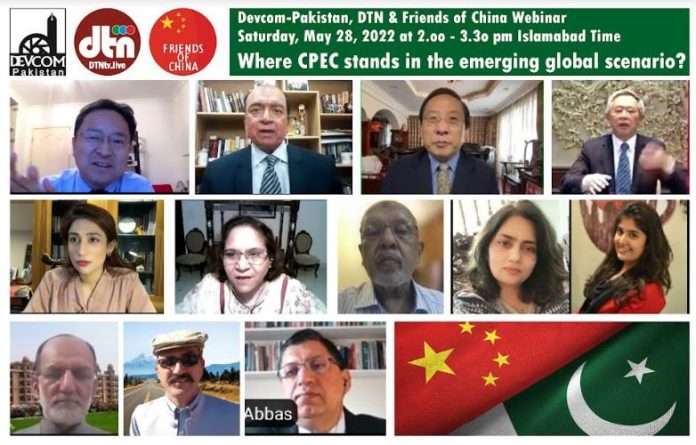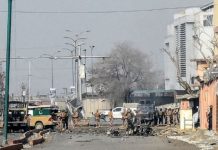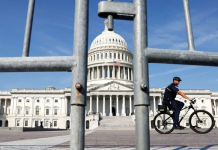ISLAMABAD, MAY 29 /DNA/ – Devcom-Pakistan bilateral webinar pinpoints multiple severe threats to the energy sector, economic security, geopolitical defense and food shortage. The experts urged collective vision, absolute wisdom and integrated efforts to protect the greater South and West Asia. Geopolitical analyst Munir Ahmed announced the launch of Pak-China Friendship and CPEC Awards to identify, recognize and appreciate individuals and organizations dedicated to the exemplary bond of the two nations. The initiative will encourage and inspire others to follow the suite.
Islamabad – Speakers at the Devcom-Pakistan webinar urged the governments and other stakeholders to come up with a Pak-China plus movement to combat the challenges emerging from the regional conflicts. The geopolitical pursuits are likely to hit China-Pakistan Economic Corridor (CPEC) if cohesive and corrective measures are not taken. The intensifying cold war strategies and increasing interest of the US, UK and NATO countries in the extended region may hamper the Belt and Road Initiative (BRI) and CPEC, a very aggressive rail and road connectivity and trade regime of President Xi Jinping.
An outline of the changing global scenario is fast emerging after the abrupt withdrawal of the US troops from Afghanistan. Further adding to miseries of the extended region is the ever-increasing US and NATO deep engagement in the Russia-Ukraine war have set red alert for the future economic growth and connectivity. Seems a seismic shift to the Indo-Pacific region at large in the evolving world order.
Development Communications Network (Devcom-Pakistan), DTN and Friends of China organized the webinar on the subject “Where CPEC stands in the emerging global scenario?” on Saturday. The panel of experts included Centre for China and Globalisation (Beijing) Vice President Prof Victor Gao, Amb Retd Naghmana Hashmi, Pakistan China Joint Chamber of Commerce and Industry (Beijing) president Wang Zihai, Embassy of China in Islamabad Cultural Counselor Zhang Heqing, Centre for China and Globalisation (Beijing) Sr. Research Fellow and Media Expert Zoon Ahmed Khan, Devcom-Pakistan Executive Director Munir Ahmed, EastWest Institute (London) Senior Research Fellow Dr. Najam Abbas and University of Peshawar Head of China Study Center Prof Dr. Zahid Anwar.
Centre for China and Globalisation (Beijing) Vice President Prof Victor Gao said highly coordinated efforts are being made by the so-called super power to put the region on fire. The Russia-Ukraine way is likely to hit the region badly. Lives and livelihoods of billions of people in the region are at stake. All the stakeholders and countries need to have a consolidated approach towards solutions. China will not compromise on any threat to its any part of land, economic and strategic interests.
He urged both the governments to launch the Pak-China plus movement for the CPEC 2.0 along with the joint information technology solutions and software development engaging the youth of Pakistan. IT technology is the future and China can offer numerous opportunities in this sector. Trade of good services shall be on top priority for the educated youth.
Ambassador retired Naghmana Hashmi said China’s speedy economic growth has been a matter of concern for the US and the West. Now, the US is the country owing largest debt to China but propagating against CPEC and BRI initiatives as a debt trap. Falls acquisitions will not work out. The next three decades are very important for the region. China shall take lead in developing vision 2050 for the region in close collaboration with the regional stakeholders. Unfortunately, the resource-base is not wide enough but we have to find the resources for an inclusive and cohesive long-term economic development and security engagement.
Pakistan China Joint Chamber of Commerce and Industry (Beijing) president Wang Zihai urged for intensive industrial cooperation between the two countries that has already been delayed for long. Pakistan needs to provide an enabling environment and security to the Chinese working in the different sectors and cities in Pakistan. The recent attacks have shattered Chinese workers and investors’ trust. Pakistan internal and external political affairs shall not affect the Chinese interests and investments. It would be a big dent to bilateral industrial cooperation.
He said the trade deficit between both countries is a big concern. Pakistan with the technical support of the Chinese industrial tycoon can develop in-land high quality products exported to China and other countries. Pakistan lacks quality standards certification that have hampered its exports. China can help in this regard too. He urged the young Pakistanis to focus on developing small enterprises rather than going after jobs. Small-scale enterprises and production units helped China to come up with the economic revolution.
Embassy of China in Islamabad Cultural Counselor Zhang Heqing emphasized that the Chinese government is fully aware of the power of collaboration in the infotainment and cultural collaboration. Once the Covid-19 will be over a comprehensive bilateral initiative will be launched for joint ventures, exchange and collaboration.
Devcom-Pakistan Executive Director and geopolitical analyst Munir Ahmed pinpoints multiple severe threats to the energy sector, economic security, geopolitical defense and food shortage. He urged for shared vision, collective wisdom and integrated efforts to protect the greater South and West Asia. He also announced the launch of Pak-China Friendship and CPEC Awards to identify, recognize and appreciate individuals and organizations dedicated to the exemplary bond of the two nations. The initiative will encourage and inspire others to follow the suite.

















